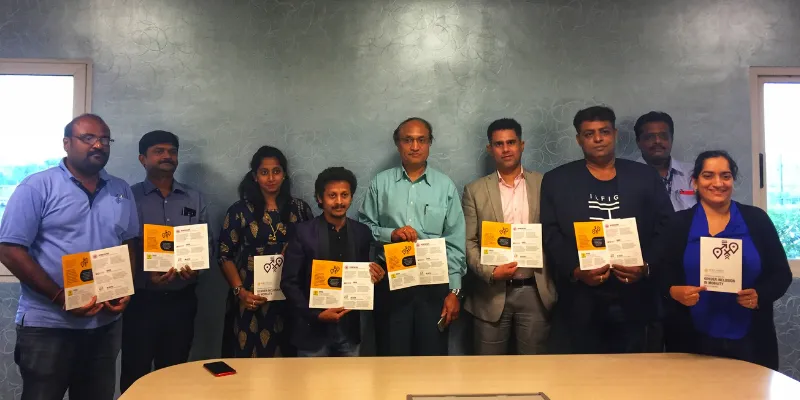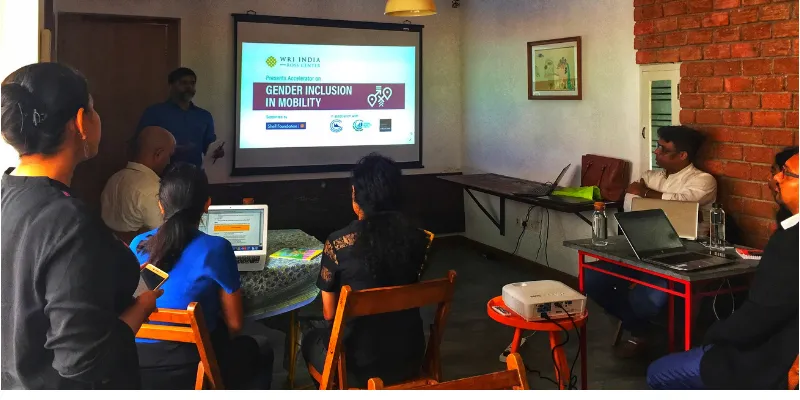Finally, an accelerator programme for solutions that ensure women's safety in public transportation
The #MobilitySheNeeds accelerator programme focuses on women's entrepreneurship, access, safety, and employment.
Safety has been one of the biggest concerns for women using public transport, no thanks to the physical harassment and other dangers they face while commuting. In a bid to find solutions to this menace and make public transport safer for women, the World Resources Institute (WRI), India, in collaboration with the Shell Foundation, recently launched an accelerator programme on ‘Gender Inclusion in Mobility’.
The underlying theme of the programme is to ‘enable safer mobility for women in Chennai’. The programme also focuses on women entrepreneurship, access, safety and employment.
Four startups working in the mobility space, with a focus on women’s participation in the workforce, are part of the programme. The shortlisted startups are Delhi-based Bikxie, Bengaluru-based Women Cabs, Pune-based sRide and Chennai-based M-Auto.
These startups told YourStory that they are looking to create a holistic and sustainable mobility ecosystem for increased, integrated and seamless commuting options for women.
Bikxie is a bike taxi service that is addressing last-mile connectivity by offering both male and female two-wheeler drivers. Women cabs, on the other hand, is an online platform, which enables women to book cabs driven by women. Targeting intra-city and inter-city rides, sRide provides ride-sharing services that encourage users to share the cost of travel and increase sustainable mobility. M-Auto focuses on women who drive auto-rikshaws and has 300 women drivers already on its mobile app.

According to a report by WRI, women’s participation in the workforce has seen a significant drop from 37 percent in 2004-05 to 27 percent in 2012-13. The participation of female labour workforce also saw a drop and was visible across areas irrespective of age, income, social group and marital status.
Limited access and safety in public transport reduces the probability of women’s labour force participation by 16.5 percent, says a report by International Labor organisation. The 2011 Census of India shows that only 17 percent of all people commuting to work in urban areas are women. Out of the total women in labour force, about 30 percent do not undertake any travel to work and 39 percent travel less than 5 km.
“In India, 83 percent of women who commute to work choose public transport and walking as their travel options, which is why this gap of last-mile connectivity needs to be addressed on priority,” says Sudeept Maiti of WRI India.
“Access to transport is access to opportunities and these opportunities are curbed because of the absence of transport at various levels. The objective of this accelerator programme is to push our boundaries on how we can customise and address the concern of last-mile connectivity in a way that we open up a lot more opportunities to work, to transit and to educate. One of the reasons why Chennai was chosen as the pilot by WRI and Shell Foundation was because the city is cognizant about the fact that there are different travel patterns the city’s residents observe, more so by women,” he added.
Addressing the startups on what investors look for before investing in them, Paula Mariwala, Executive Director at Seedfund said,
“You have to do your homework about the sector. How far are you invested in the idea and how do you plan to take it forward? It has to be a story which is believable, a plan that is executable.”
She further added, “Inclusivity is a good opportunity. A partnership is the best way forward and our collaboration with redBus is a great example. This gives a targeted customer focus in a sector that needs solutions where one can impact the society by creating an enabling environment for gender inclusion. As an investor, this is an unmet need which can be addressed by mobility companies and one can see many scalable business models here."
Rohan Choukkar of Bharat Innovation Fund spoke about a VC’s perspective on evaluating startups and looking at the mobility space as an investment opportunity. He said,
"Mobility is a big area of interest to us (and most investors, I would assume), given the sheer scope and scale of problems India faces in this sector and the changing global trends. There are myriad opportunities emerging for startups, from engineering/product companies driving the push for cleaner and safer transportation to newer modes of public, private and shared transportation, providing people with more efficient ways to travel."

The two-day long accelerator programme also saw the participation of Raj Cherubal, CEO at Chennai Smart City Limited. He said,
The traditional way of approaching problems is a passé in today’s time. I’m happy to see startups trying to address the gaps, which often larger organisations fail to notice.
On day 1 of the event, the focus was on women-centric entrepreneurship and building for investments, building sustainable scalable models, the need for women-centric startups, and investment in the mobility sector. On day 2, the startups indulged in a pitch session with the Chennai Metro Rail Limited. The session was led by Thiru L Narasim Prasad, Director (Systems & Operations) at Chennai Metro Rail Limited.
The four startups had their first round of discussion with the CMRL and other stakeholders like IT parks, hospitals and colleges in Chennai, and will be part of a pilot in the coming days.
According to a survey by National Crime Records Bureau and Nita Bhalla in 2014, non-working women in cities said lack of safety was one of the biggest reasons for their decision to not work. With startups entering the mobility space, India is now adopting technology to fill in this gap to have safer spaces for women.







